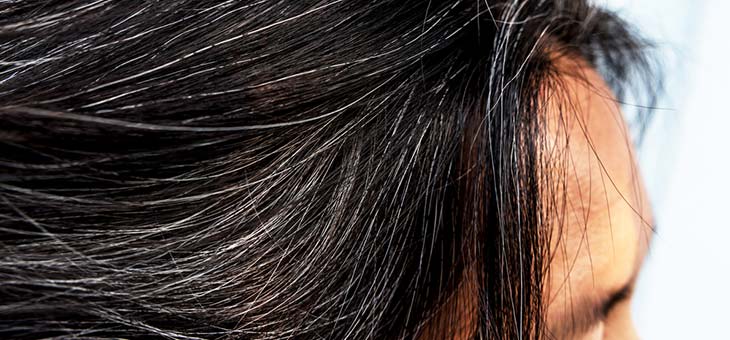US researchers have discovered that greying hair is caused by stress.
This may be common knowledge, but the study ratifies this theory and is the “first to offer quantitative evidence linking psychological stress to greying hair in people”.
So why are you still reading this?
Because researchers at Columbia University found that when stress levels were lowered or removed from participants, greying hair was halted and actually reversed.
Researchers analysed the hair follicles of greying participants who went on holiday.
When stress levels were lowered, the follicles that produced grey hair reversed and the stress-free vacationers got their natural hair colour back.
Anecdotal evidence throughout history shows stress causes grey hairs, but until now the evidence pointing to this was largely anecdotal.
As with many studies, most grey hair science had been done with mice.
One such study revealed greying was caused by an irreversible loss of stem cells in the follicle and once it went grey, there was no going back.
Read more: The ‘risk’ of letting your grey hair grow out
Another study attributes greying to ‘ageing’ melanin – the pigment that colours skin, eyes and hair – which, as we age, produces hydrogen peroxide which can strip colour from hair.
But what works in mice doesn’t always translate to humans.
The Columbia University study directly links stress with greying hair, which researchers say may be a result of signalling from the mitochondria, where cells produce energy.
“We often hear that the mitochondria are the powerhouses of the cell, but that’s not the only role they play,” said senior author Martin Picard.
“Mitochondria are actually like little antennas inside the cell that respond to a number of different signals, including psychological stress.”
The researchers took individual hairs from 14 volunteers and developed a new method “for capturing highly detailed images of tiny slices of human hairs to quantify the extent of pigment loss (greying) in each of those slices”.
They analysed slices of hair around a 20th of a millimetre wide, which represents an hour or so of hair growth.
“Just as the rings in a tree trunk hold information about past decades in the life of a tree, our hair contains information about our biological history,” said Dr Picard.
Read more: How to keep grey hair looking healthy
“When hairs are still under the skin as follicles, they are subject to the influence of stress hormones and other things happening in our mind and body. Once hairs grow out of the scalp, they harden and permanently crystallise these exposures into a stable form.”
Using a high-resolution scanner, they detected small, subtle variations in colour, which, when compared to a volunteer’s stress diary, revealed “striking associations between stress and hair greying” and, in some cases, they saw a “reversal of greying with the lifting of stress”.
“There was one individual who went on vacation, and five hairs on that person’s head reverted back to dark during the vacation, synchronised in time,” said Dr Picard.
While reducing stress in your life is a good goal, it won’t necessarily turn your hair to a normal colour, says Dr Picard.
“Based on our mathematical modelling, we think hair needs to reach a threshold before it turns grey,” he said.
“In middle age, when the hair is near that threshold because of biological age and other factors, stress will push it over the threshold and it transitions to grey.
“But we don’t think that reducing stress in a 70-year-old who’s been grey for years will darken their hair or increasing stress in a 10-year-old will be enough to tip their hair over the grey threshold.”
While this may be exciting news for greying Aussies, the researchers are now intrigued by what other signs of ageing can be reversed and believe this study has “broader significance than confirming age-old speculation about the effects of stress on hair colour”.
Read more: A cure for grey hair
Learning how grey hairs return to their ‘young’ pigmented states “could yield new clues about the malleability of human ageing in general and how it is influenced by stress,” said Dr Picard, adding that this new evidence demonstrates “that human ageing is not a linear, fixed biological process but may, at least in part, be halted or even temporarily reversed”.
Have you embraced your grey or would you like to change it back to your original colour? Why not share your thoughts in the comments section below?
If you enjoy our content, don’t keep it to yourself. Share our free eNews with your friends and encourage them to sign up.

